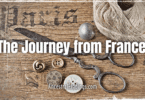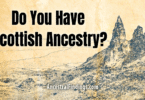The fields around Kassel shimmered in the summer light, the scent of rye and damp earth thick in the air. Johann Müller paused his plow horse and wiped his brow. His father’s land had been small when he inherited it. Now, after decades of division among brothers and cousins, it was barely large enough to feed his family.
“Land doesn’t grow, Johann,” his wife, Greta, said one night as they sat beside the hearth. “But our children do.”
She was right. Their eldest, Matthias, was almost eighteen, with no land and no trade to inherit. The soil was tired. Taxes were heavy. And across Germany, revolution and unrest were spreading like a fever.
Johann’s grandfather had once told stories of cousins who had gone to America, where the soil was rich and a man could own what he worked. Those stories had sounded like fairy tales when Johann was a boy. Now, they sounded like survival.
Life in Hesse
The Müllers had lived on this same slope for generations. Johann’s grandfather, Heinrich, was born during the tail end of the Thirty Years’ War, a time when soldiers still roamed the countryside and taxes consumed every spare coin. Heinrich’s son, Dieter, rebuilt the house after a fire and kept bees in the orchard. Johann still used his grandfather’s old hive tools, smooth from decades of use.
In the evenings, Greta lit an oil lamp and read from the family Bible, its margins filled with names and dates—births, marriages, and deaths written in careful German script. Their son Matthias would trace the lines with his finger and whisper, “We have always been here.”
Johann would nod, his face shadowed by the lamp’s flicker. “Yes,” he said quietly. “That is the problem.”
A Nation in Turmoil
By 1848, revolution was in the air. Across the German states, citizens demanded democracy, land reform, and freedom from oppressive rule. Soldiers marched through Hesse to put down uprisings. Crops failed again, and the price of bread climbed beyond reach.
In Kassel’s market square, merchants and farmers gathered to discuss rumors of a new life across the ocean. A neighbor named Bauer returned from Bremen with a folded pamphlet, printed in rough English: Land in America for the hardworking man! He spoke of letters from cousins in Cincinnati, a city full of German bakeries, Lutheran churches, and music halls.
Johann read that pamphlet three times before slipping it into his coat pocket. “They say the voyage takes six weeks,” he told Greta.
“And if the sea takes us?” she asked.
He looked into the fire. “Then the sea will bury us where the land has refused to feed us.”
Greta took his hand. “Then we must go,” she said, “while we still have the strength.”
Leaving the Homeland
In April 1849, the Müllers left Kassel with three children: Matthias, sixteen; Liesel, twelve; and baby Wilhelm. They carried one wooden trunk, a beehive frame from Dieter’s orchard, and Greta’s Bible.
The ship from Bremen was called Der Löwe. It was old and creaking, its decks crowded with families, trunks, and livestock. Johann worked to help the crew secure the cargo, reducing their fare by a few marks.
Liesel would remember that voyage for the rest of her life—the gray sky, the smell of salt and sickness, the way the waves rolled like mountains. At night, her father whispered to her mother, “I never thought the world could be this large.”
Greta answered softly, “And I never thought it could be this empty.”
After seven long weeks, Der Löwe reached New York Harbor. There was no Ellis Island then, only the receiving hall at Castle Garden. Clerks shouted names and destinations in a dozen languages. When a clerk asked Johann where they were going, he replied carefully, “Cincinnati.”
The man nodded. “You’ll find your people there.”
The New World
Cincinnati in 1849 was a city of noise and smoke, the air heavy with the scent of yeast from its many breweries. The narrow streets of the Over-the-Rhine district echoed with German voices.
Johann found work in a brewery, hauling kegs down to the cool cellars by the river. Greta took in laundry. Matthias apprenticed with a cabinetmaker, his hands quick and sure.
On Sunday evenings, the family attended St. Mary’s Church, where hymns were still sung in German. Greta closed her eyes during the service and imagined the bells of Kassel. Johann would watch his children—healthy, fed, laughing—and know they had made the right choice.
When Johann died in 1872, Matthias buried him beneath an oak tree in St. John’s Cemetery. The headstone bore the words:
Geboren in Hesse, Gestorben in Freiheit.
Born in Hesse, Died in Freedom.
A New Generation
By the time Matthias took over his cabinet shop, Cincinnati had grown into a city of spires and breweries. German was spoken in schools, theaters, and shops.
He married Anna Vogel, the daughter of a Württemberg shoemaker, and together they raised three children—Karl, Elise, and Paul. At home, they spoke German; in school, the children spoke English. “We must belong here,” Matthias told them, “but never forget who we are.”
Karl enlisted during the Spanish–American War and returned home with a limp. Elise married a pharmacist who strung one of the city’s first electric signs above his shop. Paul remained in the workshop, carving church pews adorned with lilies that seemed to climb toward heaven.
Then came the Great War.
The Shadow of Suspicion
When World War I began, suspicion toward German Americans spread quickly. Newspapers warned against “foreign sympathies.” Streets named for German poets were renamed.
One morning, Paul awoke to find the family shop sign—Müller & Sons Fine Cabinetry—defaced in red paint. Someone had scrawled the word Traitors.
Paul painted over it himself, changing the name to Miller. “It’s easier this way,” he told his wife. “Wood has no homeland.”
He was right. By the war’s end, the German language had nearly vanished from public life in Cincinnati. Yet at home, over bread and honey, the family still whispered the old words—Danke. Guten Morgen. Schatz.
Through the Depression and Beyond
The Great Depression closed many small shops, including the Millers’ cabinetry business. Karl’s son Henry found work at a printing press. His sister, Clara, became a teacher.
They carried their heritage quietly. The family Bible, still in Greta’s careful handwriting, sat wrapped in linen inside a cedar chest. Every Christmas, Clara baked the same honey cookies her great-grandmother had made in Hesse.
In 1955, when Henry’s son Walter came home from the Korean War, Clara handed him the Bible. Its pages were fragile, the ink fading. “What will I do with this?” Walter asked.
“Keep it,” Clara said. “It’s our map.”
The Rediscovery
Decades passed. Walter’s granddaughter, Emily, was twenty-eight when she opened that same Bible for the first time. She was building her family tree online when a question appeared: Do you have German ancestry?
She smiled and whispered, “Yes… I think we do.”
That night, she searched through digitized census pages and passenger lists until she found Johann Müller’s name on a Bremen manifest. His handwriting was neat, steady—the same script she’d seen in the Bible.
A month later, Emily stood in Germany. Kassel had changed, but the hills were the same. She walked along the ridge where the family farm had once stood and breathed in the scent of rye and damp soil.
She whispered, “We came from here.”
For a moment, it felt as if the centuries folded in on themselves. She could almost hear Greta’s voice again:
“Land doesn’t grow, Johann, but our children do.”
The Legacy
When Emily returned home, she framed Johann and Greta’s names beside the family Bible. Her father looked at it and smiled.
“They’d never believe we’d still be talking about them,” he said.
“Maybe they would,” Emily answered. “After all, they crossed an ocean so we’d have something worth remembering.”
She turned to the window. Beyond it, the Ohio River rolled past—brown, steady, unending. And somewhere far away, the Neckar River still flowed through Hesse. The waters would never meet, yet they belonged to the same story.
The journey from Germany was more than a crossing of oceans. It was a bridge of generations—a promise carried forward, one name at a time.






